A stylish bit of A-24 terror with Brandy Norwood squaring off against Kathryn Hunter, who played one of the witches in the Denzel/McDormand/Coen “Macbeth.”
Sept. 6.
A stylish bit of A-24 terror with Brandy Norwood squaring off against Kathryn Hunter, who played one of the witches in the Denzel/McDormand/Coen “Macbeth.”
Sept. 6.



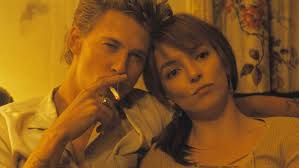
“The Bikeriders” is hands-down the most pointless biker movie ever made.
With a narrative limping along on one training wheel, it mopes in an inane circle through the middle era of modern biker gangs, between the post-war “Wild One” birth of such “clubs” and ending just as the Hell’s Angels, The Outlaws, Bandidos and Mongols moved from traffic scofflaws and motorcycle theft into the drugs, extortion, prostitution and murder-for-hire of true organized crime outfits.
The best book about such gangs and this period was by Hunter S. Thompson, “Hell’s Angels: A Strange and Terrible Saga.” “Bikeriders” is based on Danny Lyon’s 1968 photos and interviews book of the same “Bikeroders” title.
Based solely on the movie, Lyons’ must be the inferior piece of journalism and character study. Based on writer-director Jeff Nichols’ casting of the interviewer “Danny” in the movie, played without wit, color or the suggestion of intellectual curiosity by Mike Faist, Nichols wasn’t all that impressed with it or him either.
As the viewer waits for a point to creep in, something beyond romanticizing or demythologizing the original “One Percenters” as louts, dolts and drop-outs, one wished somebody had paid more attention to “Sons of Anarchy” back when it was on the TeeVee. This isn’t just bad. It’s fatally uninteresting.
Austin Butler is Benny, a reckless, heedless Illinois punk who says “You’d have to KILL me to get this jacket,” his beloved Vandals’ “colors,” in a biker-unfriendly bar in Greater Chicagoland.
Benny is tough, able to take a beating, and a masochist, more than willing to take it.
He’s also so stupid he can’t figure the odds, evaluate his own fighting skills, and work out a better battle to pick.
We see how Benny met “riders club” founder Johnny (Tom Hardy) and how the two came to depend on one another. Kind of. As the story is told by Benny’s on-again/off-again biker moll Kathy, played by Jodie Comer, every bit of the history is sketched in by a long-winded woman with no gift for getting to the point, or having one.
Nichols makes this Comer and Kathy’s movie, as her endless anecdotes and dull history lessons begin with the fateful night a girlfriend lured her into a biker bar “meeting,” where leering, “You got a man?” come-ons start out aggressive and take on real menace.
Benny was her savior that night. And he sat on his parked Harley all night in front of her house and all the next day until her working Joe boyfriend stormed out on her.
Johnny? His “Don’t worry…about nothing,” implies that he and Benny can protect her from the other Vandals, and that the Vandals can protect her from outside threats.
Here’s the neat thing about this script. The “outside threats” are few and far between, generic biker tussles in the “fists or knives” mid-60s. The gang rides to intimidate unfriendlies of every stripe, little motorized Nuremberg rally visuals for the awed locals.
Is there a political parallel for today, that the thugs the culture fears are nothing but empty Levi’s jackets on bikes? Nah.
I’ve been a big fan of Nichols since his “Shotgun Stories” debut, through “Mud” and “Loving.” But “Bikeriders” is an artless parade of closeups, waiting for the actors to get to the nub of a line, the movie to impress on us the necessity of a scene and the narrative to come to some sort of point.
Comer’s monologues are banalities sprinkled with cliches, none of them amounting to a nugget of profundity or a big theme about alienation, nihilism and “guys who don’t belong nowhere else,” they just “belong together.”
Any messaging about “The Golden Age” of motorcycle gangs, before they turned even more criminal, is laughable.
Comer is believable in the part, but like even the “types” in the gang — save for Michael Shannon, playing the doltish, foreign-born “Zipco” — Kathy is painted in colorless strokes. We don’t see an interior life, the dullness she might be escaping, the dead-end her limited future offers, the danger she stupidly ignores until the obvious happens.
Butler? He’s about as convincing a dangerous biker as Elvis was.
As my attention drifted into how one might have gotten a more compelling, entertaining or enlightening movie about this culture (adapt a BETTER WRITTEN BOOK) and era, bits of miscasting, scenes that defy cinematic convention and merely frustrate when they could titillate, terrify or what-have-you, I burned-out that rear tire down to the threads of one ugly conclusion.
This is a two hour waste of a lot of fine vintage motorcycles.
Rating: R, violence, profanity
Cast: Tom Hardy, Austin Butler, Jodie Comer, Boyd Holbrook, Norman Reedus, Mike Faist and Michael Shannon.
Credits: Scripted and directed by Jeff Nichols, based on a book by Danny Lyons. A Focus Features release.
Running time: 1:56

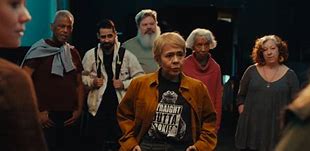


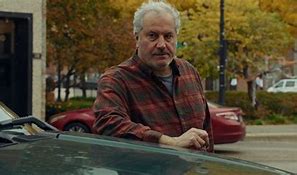
“Ghostlight” is an intimate, moving indie drama about the transformative power of art and the mental health benefits of the theatre.
An “actors’ picture” in the purest sense of the phrase, its players take us on an emotional journey that covers limited ground, but manages to be an enriching, deeply rewarding experience nevertheless.
Keith Kupferer stars as Dan, a gruff highway construction worker sleep-walking through his days jack-hammering streets and sidewalks in his corner of Illinois.
Dan, we quickly learn, is getting it from all sides. He’s got an out-of-control teen (Katherine Mallen Kupferer) at home, a passive, sometimes-impulsive wife (Tara Mallen). And every pedestrian wanting a little peace and quiet and every rude, rushed driver feels the need to yell at the 50something laborer in the orange vest.
Something’s going on, driving all that domestic dysfunction. Daughter Daisy might get kicked out of school. There are “depositions” to prep with a lawyer, and counselors to drag Daisy to.
It’s enough to make Dan snap. But just as he does, this pushy little woman (Dolly De Leon) who has been complaining about the noise drags him into a storefront.
“I need your help with something.”
That “something” is a theater company she’s in. They need warm bodies, and Dan? He has the look of a Capulet. Wait, what is this?
“Your salvation,” Rita assures him. She looked Dan up and down, saw him mel tdown, and figured “you might like being somebody else, for a while.”
“Ghostlight” scampers past that unlikely turn of events and hurls this Blue Collar Joe into breathing exercises, limbering-up techniques and the “Provocative Questions” game, something actors play to measure, improve and acknowledge “emotional intelligence,” put themselves in another’s shoes and be “available” “in the moment.”
Dan, bottled-up and burdened by a sea of troubles, starts to connect to himself, his family and their problems by rehearsing “Romeo and Juliet.”
“Isn’t the language gorgeous,” a castmate enthuses? “I just wish I knew what it meant,” Dan admits.
Actress-turned-writer/director Kelly O’Sullivan and co-director Alex Thompson (“Saint Frances”) manage to make a generally unsurprising melodrama into a life-affirming delight.
So much of this is “on the nose” and predictably-sweet that “Ghostlight” flirts with becoming maudlin.
The novelty of casting a real-life couple, veteran stage actors, and their daughter, in the lead roles is cute enough to almost overwhelm the slight story and its “We all saw THAT coming” twists.
It turns out that the fiery Daisy knows Shakespeare, has the play memorized and was — until recently — a regular thespian in her high school. She too might be “transformed” by this amateur production.
But the players make the sale, and make this picture sing. The performances are mostly-understated, with barely glimpsed simmering fury in scenes where it isn’t evident. The youngest Kupferer takes things believably over-the-top as a mouthy, volatile teen in crisis.
The play within the picture is also “on the nose,” as far as subject matter. But as anybody who appreciates the Great Works of the Theatre knows, even the most shambolic “Romeo and Juliet” can come off, if the performances allow it.
De Leon’s Rita is every pie-eyed dreamer who fell in love with the stage, never came close to making it and yet never can let it go.
There are plenty of theatre nerd chuckles in the stumbling rehearsals, the unconventional casting and the “drama” behind the drama — demands for “an intimacy coordinator” on set — small-timers with big egos, older actors finding the soul of teen love and impulsiveness, or the perfect song to contemporize a 430 year-old play.
The miracle of “Ghostlight” is that cast and crew here take the punch-lines associated with actors and acting, the dreamy delusions its often overly-sensitive practitioners are famous for, and turn them into the greatest gifts acting gives to actors.
Emotional availability and “healing” might be just down the street with a bunch of cockeyed dreamers who just want to “put on a show,” with or without an intimacy coordinator.
Rating: R, fisticuffs, profanity, adult subject matter
Cast: Keith Kupferer, Katherine Mallen Kupferer, Dolly De Leon and Tara Mallen.
Credits: Directed by Kelly O’Sullivan and Alex Thompson, scripted by Kelly O’Sullivan. An IFC release.
Running time: 1:54




The Austrian thriller “The Devil’s Bath” is a patient, pitiless descent into madness, belief and the helplessness of a time and place where life was, as the philosopher put it, “nasty, brutish and short.”
Based on research of historical case studies of 18th century Austria, it’s about troubled women and the scanty support and comfort they’d receive from their families and their faith in a hardscrabble subsistence society from much more recent history than you’d think.
Filmmakers Veronika Franz and Severin Fiala take us to a place and time where lumbering, communal fishing and farming were practiced, where life was unspeakably hard and when society and sanity’s margin for error were at their thinnest.
A new bride is tested by what she can’t understand, what the Church can explain or comfort her out of and what faith will not forgive.
That’s the world Agnes (Anja Plashg) has married into. Burly, grinning Wolf (David Scheid) from a nearby village has taken her in, spent his savings and her dowry on a farm, and invited her into this life.
Their wedding day might be their last happy day. Agnes is struck by the beauty of nature, so much so that she’s given to wandering reveries, collecting insects and shells and such. It’s not a lifestyle that can indulge such idleness.
Her stern mother in law (Maria Hofstätter) seems supportive, but Agnes is slow to pitch in on the fishing, the livestock tending, the cooking and house-keeping, and slower to catch on.
“The Lord won’t like it if you don’t cook for your husband!”
Her wedding night is a disappointment and her fervent desire for babies seems thwarted. Does Wolf play for the other team?
She sees the decapitated, ritualistically dismembered corpse of a woman who tossed her baby over a waterfall, witnesses the tragedy of a suicide and hears the words of the Catholic priest, who lectures one and all on what “crimes” can be forgiven and absolved, and those that cannot.
With her family insisting she stick with the marriage and live in the village where she has no friends, what options does Agnes have in this harsh, myopic reality?
Writer-directors Franks and Fiala immerse us in these brutish lives, underscoring just how limited the reach of The Age of Reason really was. Their film evokes “Midsommar” and “The Witch” in its blunt depiction of superstition as tradition and “primitive” ways and thinking.
Earthly suffering was a given, with heaven as the main promise of relief. Agnes and everyone else must struggle to eat, stay warm, avoid accidental death or grievous injury and procreate.
Survival is nasty business, and animal slaughter and cruelty are hard-wired into this illiterate, isolated culture.
All Agnes can do is lean on her faith, fretting over where “the altar” will go in their new house, and the more primitive shrine she can piece together in the root cellar. Her immediate experience and that of those surrounding her is all she has to guide her life.
It’s not enough.
Plaschg registers confusion and pathos in her performance. She lets us see the “problems” and “quirks” in Agnes’ personality, and fear for how they might be her undoing. Hofstätter’s mother-in-law seems harsh but rational and not all that unreasonable, given their circumstances.
Fiala and Franz give us a couple of scenes of heartbreaking grimness and unblinking cruelty, and a dozen other reminders of how unforgiving this world was to those struggling through it. The rituals, from weddings to executions, have an awful callousness that rattles modern sensibilities.
The film’s pacing is a tad too deliberate for its own good, spacing its shocks out, giving away its message and the direction it is going in long before it takes us there. But “The Devil’s Bath” (” Des Teufels Bad,” in German with English subtitles) is a reminder that then and now, the horrors of the supernatural can’t hold a candle to the terrors of reality at its ugliest.
Rating: unrated, graphic violence, nudity, sex
Cast: Anja Plaschg, David Scheid and Maria Hofstätter
Credits: Scripted and directed by Veronika Franz and Severin Fiala. An IFC release.
Running time: 2:01
Peyton List and Brianna Middleton are among the embattled offspring.
“Coming soon?”

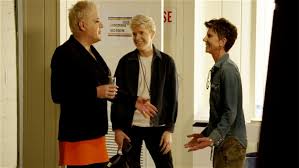
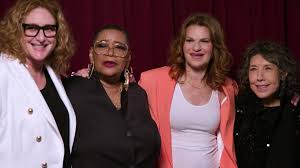
“OutStanding: A Comedy Revolution” is one of the most informative and certainly the most entertaining historical documentaries about LGBTQ history on offer this Pride Month.
Built around Netflix’s earlier 2022 “Stand Out:An LGBTQ+ Celebration,” featuring legions of “out” gay entertainers performing, writer-director Page Hurwitz adds scores of intereviews with journalists, a historian and generations of gay comedians to tell the story of gay comedy.
Who inspired Lily Tomlin, Wanda Sykes, Bruce Vilanch and Billy Eichner, and who stuck up for whom as gay comedy took to the barricades of the ’60s, ’70s, 80s and beyond Culture Wars?
The film remembers assorted “sea change in America” moments such as Madonna joining Sandra Bernhard to flirt and joke around on the set of David Letterman’s first late night show, Ellen DeGeneres coming out on her sitcom — but first to her friend and fellow “Lebanese” Rosie O’Donnell.
When Wanda Sykes recalls seeing Jackie “Moms” Mabley on TV as a child, and thinking “I could do that,” a historian is here to remind us that Moms came out “in her 20s, in the 1920s.”
Lily Tomlin is widely-accepted as a gay comic trailblazer, breaking out on “Laugh-in,” but turning that fame into one-woman shows, a stage act and character “bits” that took even on gay bashers like Anita Bryant. But Robin Tyler beat Tomlin to the punch, the first openly-lesbian comic to appear on TV, get her own show and coiner of the early gay rights rallying cry, “We are Everywhere.”
“I don’t mind them being ‘born again,'” Tyler famously joked of the wave of homophobes summoned to activism by Bryant and Rev. Jerry Falwell. “But why do they have to come back as themselves?”
Tomlin inspired Bernhard. And Margaret Cho roared into prominence on their heels.
Scott Thompson’s place in “The Kids in the Hall,” where drag was performed to hilarious effect, let confused and/or closeted teens feel “seen.” A generation of comics followed.
And as comedians and gay culture faced the twin threats of AIDS and official Reagan era indifference, comedians found themselves taking on activism as part of their portfolio, facing “the fierce urgency of the now.”
“OutStanding” brushes on recent history, too, tracking the “acceptable” 1960s homophobia of Mel Brooks through Eddie Murphy, Andrew Dice Clay, Sam Kinison and on to Dave Chapelle, Bill Maher and others.
“Every word is a bullet,“ Marsha Warfield reminds us, and them.
“There’s no such thing as ‘just kidding,’ elder stateswoman Robin Tyler declares. When somebody tells transphobic jokes, assume “they mean it.”
“Outstanding” isn’t on a par with the great queer film history docs about “The Celluloid Closet.” But it’s a bracing, quick and funny survey of queer comedy history, from Moms to Wanda, Scott to Billy Eichner, from Eddie Izzard before the on-stage dresses and heels to “Dress to Kill” Eddie to Suzy Eddie Izzard in all her present day, marathon-running, makeup loving glory.
This time, this “revolution” was “televised.” All we need to do is remember it and laugh.
Rating:TV-MA, profanity
Cast: Lily Tomlin, Wanda Sykes, Scott Thompson, Marsha Warfield, Rosie O’Donnell, Robin Tyler, Bruce Vilanch, Tig Notaro and Eddie Izzard.
Credits: Scripted and directed by Page Hurwitz. A Netflix release.
Running time: 1:39

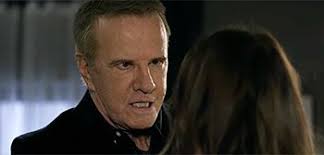


The setting is striking and ancient, with the unmistakable Bridges of Edinburgh used as a backdrop time and time again.
There’s no real reason for the Italian pan-national thriller “It’s Not Over” to set 20 or so scenes in front of, say, the Forth Bridge, and use it and other bridges dozens of other times as establishing shots. But then there are a lot of things seriously unexplained in this cinematic claptrap.
Perhaps the reason Edinburgh is never uttered is that the city sued to get their name out of this debacle. It’s certainly the worst movie ever filmed in Scotland.
It’s got an Italian star (Gianna Capaldi) doing his damnedest to manage a Scots accent. It’s got Frenchman Christopher Lambert playing his father and leaving any attempts to speak Scots to Craig Ferguson.
The femme fatale our young hero, Max, falls for is named Sarah, just buried her husband and mentions her childhood in “Colorado” — in the Polish-Italian accent of Weronika Rosati.
She’s been cheating on that abusive husband and assure her lover Max that she’ll break the news to him. But instead, Max shows up as the cops are tidying up after an “accident” that killed the creep and left Sarah a beautiful, rich widow.
Sarah loves to take Polaroids of freshly-killed animals as “art,” and speaks in foreshadowing “riddles” that are not riddles at all.
“You’re good with a knife.”
“I’ve had a lot of practice,” you know, as “a kid” growing up in “Colorado.”
Rosati is truly terrible on the screen, a Lake Bell look-like with no presence at all. Saddling her with an even less charismatic co-star seems fitting, as Capaldi’s lifeless performance matches the corpse Max is destined to become.
“It’s not over,” he gasps, unconvincingly, as he bleeds out. And so it isn’t. Curious/furious Dad, and visions of Max haunt our murderess as she goes about her Polaroid-snapping business in a city that refuses to left her call it by name.
The cop (Ian Reddington) who investigates Max’s disappearance? The one who keeps dismissing parental concern with “just a coincidence” and “people take off all the time” — repeatedly? He’s so indifferent you half expect an American accent out of him.
Writer-director Alessandro Riccardi makes his writing directing debut with this debacle. I swear I saw a “based on a novel by” credit, but didn’t jot it down and can’t find it mentioned anywhere.
Just as well. One and all will have her or his career scarred by this disaster. No sense adding to the body count.
Rating: R, violence, sex
Cast: Gianni Capaldi, Weronika Rosati and Christopher Lambert
Credits: Scripted and directed by Alessandro Riccardi, based on a novel by someone who’d rather their name was left out of this. A Lionsgate release.
Running time: 1:31
Based on the Laura Lippman novel, this ’60s period piece (Dame Shirley singing the best song from “Man of La Mancha” in the trailer) is about a Baltimore housewife digging into an unsolved murder.
Y’lan Noel, David Corenswet and Mikey Madison also star.
This limited series comes to Apple TV+ July 19.
That’s a durable thriller/horror title, evocative enough to be recycled even if most movies carrying this name have little to do with one another.
This Kit Harington vehicle was filmed under “What Remains of Us,” a story of a British family, holed up in the woods, “cursed” by what has a whiff of “Dad’s a WEREwolf” about it.
Maybe not.
Ashley Cummings co-stars, with grizzled character player James Cosmo as Caoilinn Springall as the little girl trying to make sense of Daddy’s “moods.”
July 26.
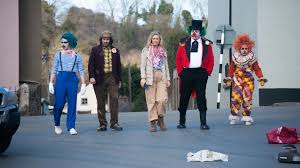

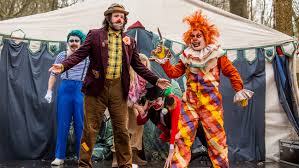
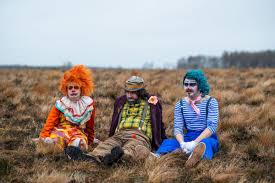
Perhaps you didn’t know you needed a twisted comedy about clowns, on the backroads of Ireland after “The Event,” struggling for fame, love and simple “acceptance” after the world ends.
But everybody gets the joke, that even after the power goes out and civilization takes a tumble, those wigged, rubber-nosed greasepainted mimes will still have trouble holding a crowd.
“Apocalypse Clown” is about an entertainer who never made it — Bobo (David Earl) — and one who did, the formerly Great Alfonso (Ivan Kaye), about an incompetent clown apprentice, Pepe (Fionn Foley) trying to pay tribute to the mentor who stroked-out at how bad his act was, and a wild-eyed, wild-haired “street clown” — Funzo (Natalie Palamides, who steals the movie) — who can’t understand why her psychotic come-ons don’t lure children into her tiny tent in public parks.
Stephen King? “Who’s that?”
Can failing reporter Jenny (Amy De Bhrún) get past her daughter-of-a-famous-journalist mommy issues, the bad decisions that had her drunkenly sleep with a clown once and her conspiracy mania to let the world know “solar flares” did it? Because, when everything electronic quits working, it’ll take some seriously analog thinking to set things right.
With well-worn acts, in costume and born to entertain, the clowns figure “This is our time.” Hell, they’ve even got a hand-cranked diesel Renault clown car to travel the country with. Because no car more more modern than that will start.
Only old issues, murderous grudges, petty rivalries and a grotesque lack of talent could hold them back.
Veteran TV director George Kane (“Flacks,” “Timewasters,””Crashing”) helms a comic winner that sprints out of the gate as we see Bobo lose his last job, “depressing” the children in a hospital, Pepe cause his French mentor’s (Barry McGovern) death and the vain Great Alfonso appear on TV promising a comeback when all they really want him to do is pay tribute to the dead clown DuCoque.
Jenny is sure she has a scoop about a coming calamity. But first, go cover this clown funeral, “big shoes to fill,” “Will they all show up in one car?” You know the drill.
A riot at the service gets them all tossed in the clink. It seems street psycho clown Funzo has drawn first blood from the human statues in her local park, and that feud with a Statue of Liberty and a two-fisted, body-painted Jamed Joyce intruded on the funeral.
But being in jail kept them in the dark when the lights went out and “The Event” happened. When they get out, Funzo figures their “clown troupe/fight club” should make its mark in this primitive new world. Maybe not.
Bobo crushes on Jenny. Alfonso schemes, brushes off remarks about his dark past and bullies, Pepe guards his mentor’s body and Funzo tries to ignore warnings that they’re still “fax modems” and “travel agents,” obsolete creatures in a world that stopped needing them decades ago.
Palamides is the stand-out in the cast — demented, dizzy, oddly-accented and capable of anything. But Earl’s hangdog act, Foley’s sadly self-aware mime, De Bhrún’s bellying up to the bitter bar and Kaye’s gift for grandiose and grotesque all contribute to the grim fun.
Throw-away one-liners land, daft enounters with a food truck hunk and a hippy “faire” whose inhabitants are set up to be survivalists, but would rather just consume all their drugs and stakes that rise as Jenny hopes against hope that she’ll have the means to announce her “scoop” to the world propel “Clown Apocalypse.”
It still bogs down terribly in the later acts, but manages to find a little suspense and a big laugh or two the finale.
Hey, as long as you leave them laughing, right?
Rating: unrated, violence, profanity
Cast: David Earl, Natalie Palamides, Amy De Bhrún, Fionn Foley, Tadhg Murphy and Ivan Kaye.
Credits: Directed by George Kane, scripted by Demian Fox, Shane O’Brien and George Kane. A Blue Fox release.
Running time: 1:42
Roger Moore's film criticism, against the grain since 1984.
Living in a Mann’s World
Get your short film showcased at the FEEDBACK Film Festival. Get your screenplay showcased at the Writing Festival.
Film reviews, news, previews and general insane ramblings of a film enthusiast!
Movies, Reviews,Trailers,Interviews and News
A monthly event... LAFeedbackFilmFestival.com
"Find what you love and let it kill you." – Charles Bukowski
Keeping an eye on all the latest mainstream films and television.